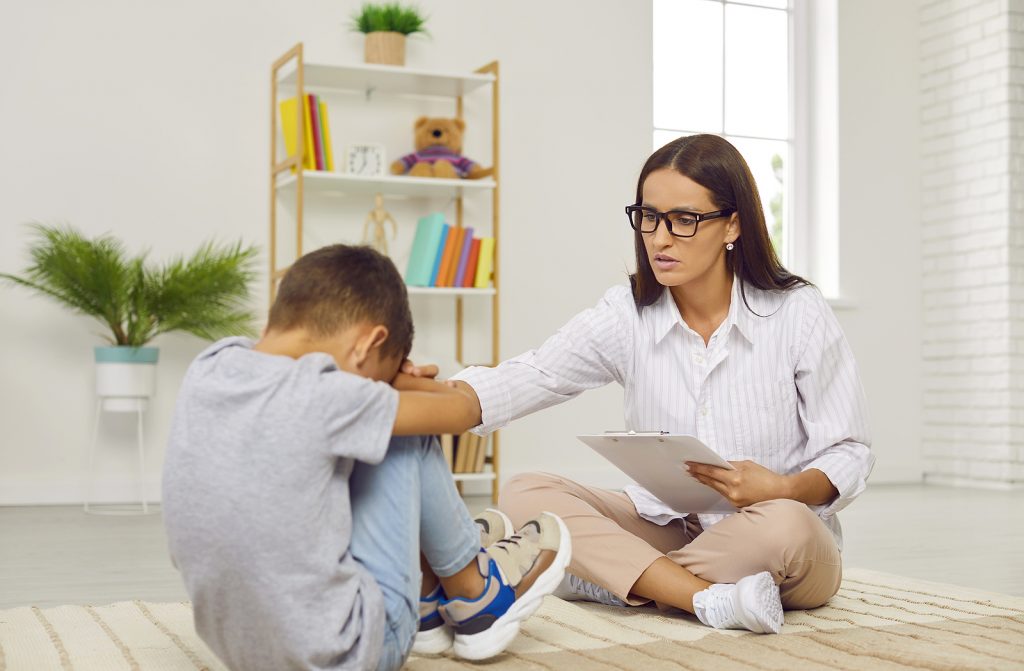Grief therapy or bereavement counseling helps people cope with emotional and mental challenges that sometimes arise from a significant loss. While people seek grief counseling for different reasons, common motivators include:

The independent providers at Las Vegas-based Kayenta Therapy offer compassionate and personalized grief and coping therapy to individuals, couples, and families who want to find healthy ways to adapt to life after loss.
The licensed therapists at Kayenta understand that everyone’s grief experience is unique to them. If you’re struggling with persistent grief, you might want to consider talking with a grief therapist. The benefits that come from taking this brave step toward improving your well-being are many:
There is no set time for when mourning ends. If you need help dealing with grief, finding support nearby can feel overwhelming. A local licensed therapist or counselor can help you understand your feelings and guide you in new ways of coping, all in a safe and confidential space.
If you’re trying to cope with the loss of a loved one or another significant loss, talking with a Kayenta grief therapist can help. Are you worried you won’t be able to afford to pay for grief counseling? Many of our graduate student therapists offer low-cost programs that make help more accessible for people without insurance or limited resources. You can also explore free or low-cost grief support groups.
If you’d like to learn more about grief counseling in your area, contact one of our therapists directly online to schedule an appointment. We look forward to helping you get the grief support you need.
Technology has revolutionized the field of therapy, providing innovative ways for individuals to seek counseling services and receive the help they need. At Kayenta Therapy, we wholeheartedly embrace the power of online therapy, specifically through platforms like Zoom, as a means of building deeper connections with our clients and offering meaningful support.

Our licensed therapists are dedicated to the transformative potential of teletherapy and believe that it can create therapeutic relationships that are just as strong as those formed in face-to-face sessions. By utilizing online platforms, we are able to overcome barriers and provide effective therapy to individuals seeking support.
Online therapy, conducted through platforms like Zoom, offers a convenient, accessible, and effective solution for individuals in need of support. It provides therapists and clients with a flexible and supportive environment that promotes personal growth and overall well-being.
While some individuals may prefer in-person therapy, online therapy via Zoom offers several benefits that others find appealing:
We firmly believe that everyone possesses the power to change, and online therapy makes growth and mental well-being accessible to all. The online therapy services provided by Kayenta Therapy eliminate traditional obstacles like geographical limitations and physical disabilities, empowering individuals to take control of their mental health journeys.
To learn more about the convenience and flexibility of online therapy via Zoom, we invite you to contact one of our therapists directly through our online platform. Schedule an appointment today and embark on a transformative and deeply connected therapeutic experience.
Navigating your emotions before, during, and after a divorce is challenging. Divorce counseling can help you manage and process painful feelings like sadness, loss, and anger. It can also help improve your communication skills and allow you to cope with the practical aspects and logistics of figuring out finances, custody arrangements, and dealing with shared family and friends post-divorce.
Regardless of how amicable your relationship with your spouse is, divorce usually involves difficult feelings, conversations, and decisions. Whether you participate in divorce counseling with your spouse or by yourself, it can help you learn healthier ways to communicate and continue building a more positive relationship after your divorce is finalized. This is especially important if you have kids, as you want to minimize the negative impact a divorce has on your children.
Conflicts and concerns about finances, parenting, schedules, and other issues can be stressful and bring up a lot of strong emotions. It’s not unusual to feel sad and depressed about getting a divorce. A therapist can help you learn how to deal with your feelings and stay grounded during this time of transition.
If you’re in the early stages of considering divorce, seeing a therapist can be extremely helpful. There is no right or wrong time to seek this type of counseling. You can do it before, during, and/or after your divorce is complete.
Divorce counseling can provide tools and skills to help you get through challenging times while caring for your mental health. Contact a therapist directly to schedule an in-person or teletherapy appointment at Kayenta Therapy.
The National Institutes of Health estimates that up to 19% of US adults had an anxiety disorder in the past year. Teletherapy can be an extremely effective option for people who live in remote areas, have mobility issues, or are hesitant to seek in-person mental health treatment.
Las Vegas-based Kayenta Therapy offers teletherapy services to individuals, couples, and families that promote trust, respect, and human dignity. Our licensed therapists are independent providers who believe that, for many people, teletherapy can be just as or more effective than traditional in-person sessions.
Anxiety is the most common mental health disorder and the one people most frequently consult a therapist about. It’s equally common among women and men and can begin to appear at early as age 13. Unfortunately, therapists are now seeing anxiety disorders in even younger children, which many experts say is related, at least in part, to contemporary issues like social media, school shootings, and bullying.
Experiencing occasional anxiety is normal for most people. However, people with anxiety disorders often experience persistent and intense worrying about everyday life. For some, these worries can escalate to the point of panic attacks.
Common anxiety signs and symptoms include:
Anxiety teletherapy is typically used to treat generalized anxiety disorder, panic disorder, and social anxiety disorder. Sometimes called online therapy, it uses video conferencing technology to conduct sessions remotely, be it on Skype, Zoom, or some other secure online platform. Some therapists and patients favor phone counseling.
While many people still prefer in-person therapy sessions, teletherapy offers several advantages many other people favor:
Used appropriately, teletherapy can be a great alternative for people who want to bring balance to their lives with ease. However, not everyone feels comfortable with or has access to the tools needed for teletherapy. In those cases, in-person therapy from a qualified and licensed mental health professional can ensure the best possible treatment outcomes.
Teletherapy might be suitable for your anxiety disorder if you:
If you need help with one or more anxiety disorders, the trained mental health professionals at Kayenta Therapy can help. Contact a therapist directly online to schedule an appointment today. We look forward to helping you reach your personal mental health goals.
It’s common for children to feel anxious or worried from time to time, especially when they’re encountering new situations. However, in some cases, an anxiety disorder may affect their thoughts and behavior daily, which can interfere with myriad aspects of their life. If your child is having a lot of anxiety, you may wonder how to help. Child anxiety counseling can be an effective solution for coping with fear, worry, and other emotional issues.

If you notice one or more of the following symptoms, your child may be suffering from an anxiety disorder.
Although separation anxiety is common in young children, older kids and teenagers usually don’t have as hard a time being away from their parents.
If you notice that your child’s anxiety isn’t going away or is getting worse, therapy can help them manage their feelings and learn how to cope when fear and worry arise. There are several types of treatment that therapists may employ in child anxiety counseling. Which ones work best will depend on your child’s age, personality, and what causes them to feel anxious or fearful.
Also known as CBT, cognitive behavioral therapy is effective in treating anxiety disorders in both children and adults. CBT teaches your child techniques and
skills to change their ways of thinking and reduce anxiety.
CBT helps children identify and replace negative thoughts and behavior patterns with positive ones. It also teaches kids how to recognize unrealistic thoughts that may fuel their anxiety. A therapist will teach your child these techniques and give them “homework” to learn how to apply them in real life. These coping skills can be used as lifelong tools for combating anxiety and encouraging healthy thinking patterns. A therapist can also advise parents and other family members on how to help their child manage symptoms.
ACT, or acceptance and commitment therapy, helps children use strategies like mindfulness and acceptance. ACT teaches them how to live in the moment and observe and experience thoughts and events without judgment. This can be an effective way to cope with unwanted thoughts and feelings.
DBT, or dialectical behavioral therapy, encourages children to examine how they deal with conflict and intense emotions and empowers them to take responsibili
ty for their actions.
In some cases, medication may be used in conjunction with child anxiety counseling. Depending on how severe your child’s anxiety is and how they respond to counseling with a therapist, medication can be a short- or long-term option.
Child anxiety counseling can provide tools and skills to help your child combat feelings of worry and care for their mental health for a lifetime. To learn more, contact a therapist directly to schedule an in-person or teletherapy appointment at Kayenta Therapy.
Telehealth services have made it easier than ever for people to get the mental health care they need. There are now several options for remote therapy, including phone counseling. Not only does accessing counseling services from the comfort of your home provide the same benefits you’d receive from in-person sessions with a therapist, but it also offers other advantages as well.

Juggling responsibilities such as a job, family, and social obligations can make it tough for some people to fit in-person therapy sessions into their schedules. Teletherapy cuts out travel time and makes it a lot easier to attend therapy sessions regularly. Telephone counseling and online therapy services offer more flexible options and make it easier to find a therapist who’s available evenings, weekends, or early in the morning.
People with social anxiety, PTSD, depression, and other mental health conditions may struggle to get to therapy appointments. Individuals with disabilities and those living in rural areas or without transportation to get to an appointment can benefit from telecounseling as well. Phone counseling provides a practical option that can be used by almost anyone who wishes to seek therapy.
Although the stigmas surrounding mental health treatment aren’t as prevalent as they once were, feelings of shame can still deter people from seeking the help they need. Teletherapy provides a safe space you can access from almost anywhere and is completely confidential, so you won’t have to worry about others seeing you at a therapist’s office.
In-person therapy sessions can be expensive, especially if you’re uninsured or prefer not to use your health insurance for mental health services. If someone has to pay $100 – $200 per session, they may not be able to see their therapist as often. Telecounseling, videoconferencing, and other low-cost therapy options can make therapy more manageable for those on a budget.
Phone counseling can be an effective option for treating mental health conditions like depression and anxiety and for people struggling with relationship issues or other life challenges. However, those who suffer from conditions like schizophrenia or need specialized treatment due to trauma issues may need to see a therapist in person.
Regardless of how you choose to access mental health services, finding a compassionate, capable therapist can help you learn more about yourself and live a healthier, happier life. To learn more, contact a therapist directly to schedule an in-person or teletherapy appointment at Kayenta Therapy.

The ways we interact with others can have an impact on our emotional well-being. Healthy and mutually beneficial relationships help us grow and learn how to give and receive love. Relational therapy in Las Vegas can help you explore how familial relationships and past experiences have influenced your patterns of relating to others and shaped your self-image.
Relational therapy is an approach based on the idea that our social world and good relationships are critical to our psychological health and self-esteem. It also helps you discover new ways of interacting with people and your environment.
Relational therapy can help with a wide range of issues, which are sometimes connected to stress or disharmony in relationships. This type of therapy can help you learn to identify problematic patterns and change them. Relational therapy in Las Vegas helps with difficulties and disorders such as:
If you have a tendency to push people away or you’re experiencing distress in your relationships, relational therapy may be a good therapeutic approach for you. It can help improve relationships of any kind, including those with family, romantic partners, friends, and coworkers.
Relational therapy is based on relational-cultural theory, which examines how human connection and culture influence relationships and individuals. In relational therapy, you’ll discuss past experiences and your therapist will invite you to explore how they may influence your behaviors today.
A key element of relational therapy is the integration of cognitive-behavioral therapy (CBT), which helps you learn how to identify faulty thinking patterns and change them. It also promotes healthier behaviors and improved self-awareness.
Applying these principles to your interactions with others can help you develop healthier, long-lasting relationships with the people in your life. Relational therapy can also help strengthen your sense of self and agency over your actions and empower you to have more trust in and patience with others. Building healthy boundaries while learning to compromise can help create balance in all aspects of your life, including your relationship with yourself.
This is just a snapshot of how relational therapy may work for you. A therapist can give you a more in-depth understanding of relational therapy and advise you of their specific methods for utilizing it in therapy sessions. Forming a successful relationship with your therapist is a critical element of relational therapy. Finding a therapist who is empathetic and non-judgmental will help you feel comfortable sharing personal matters with them. Don’t hesitate to ask about their professional credentials and specific areas of training as well.
Are you ready to try relational therapy in Las Vegas with a compassionate, competent mental health professional? Contact a therapist directly to schedule an in-person or teletherapy appointment at Kayenta Therapy.

It’s common for people to make resolutions and set goals for the new year. While it’s great to commit yourself to do things that you want to accomplish, making your mental health a priority can help you build a strong foundation that helps you handle life’s challenges and understand yourself better. Whether you’re feeling down or you’re interested in learning coping skills to deal with stress and anxiety, talking to a therapist can be an effective way to improve your mental health.
One bright side of the Covid-19 pandemic is that teletherapy has made counseling services more accessible than ever. These sessions work much the same way as traditional therapy sessions, except they are done via videoconferencing instead of in an office. One of the major benefits of teletherapy is that it’s a convenient, confidential way to connect with a therapist without having to leave your home.
We all face hurdles that are tough to tackle sometimes. Prioritizing your mental health can help you learn how to deal with challenging emotions and situations more healthily. Although anyone can benefit from talking to a therapist, some signs that it may be time to seek help include:
Just like your car needs periodic maintenance, your mental health may need a tune-up from time to time. Not only does therapy give you the tools to live a healthier, happier life, but it can also help you identify certain triggers and negative patterns and learn how to change them. Treatments like psychoanalysis, cognitive behavioral therapy (CBT), and dialectical behavioral therapy (DBT) are just as effective in teletherapy as they are in person.
Learning how to accept and deal with distressing emotions and situations and change your ways of thinking can be life-altering. It’s also important to keep in mind that you are not alone. Your therapist is there to help you get through it and provide the support and tools you need to feel better. Teletherapy can also help you achieve your goals, improve your overall health and well-being, and lead to more fulfilling relationships with loved ones.
If you’re ready to prioritize your mental health this new year, the professionals at Kayenta Therapy provide compassionate, convenient therapy services you can trust. Contact a therapist directly to schedule an in-person or teletherapy appointment.
Although the holidays are a joyous time for many, there’s no denying that this time of year can be stressful. Seeing a therapist and practicing self-care can help manage holiday stress and allow you to truly enjoy the season and time spent with family and friends.

The emotional, financial, and societal pressure to create a “perfect” holiday experience can be exhausting. It can also be a time that triggers feelings of grief and loss for those missing someone who’s gone. Traveling and dealing with family dysfunction can also cause a lot of anxiety.
Our thoughts can often be our worst enemy. Setting realistic expectations and heading off negative self-talk is a practical place to start when managing holiday stress. Being kind to yourself and practicing self-compassion can help you combat and manage the holiday stress you may be feeling. A therapist can help you learn techniques for replacing negative thoughts with positive affirmations that counteract damaging thoughts and perceptions
Prioritizing routines and activities that benefit your mental and physical health can be challenging during the holiday season. For example, if you practice yoga and meditation in the morning, it can be tempting to skip them when you have a lot to do.
Neglecting your own needs will only lead to more holiday stress, anxiety, and frustration. There’s nothing wrong with removing something from your holiday to-do list or saying “no” to an invitation if it helps you stay calm and relaxed. There are many different things you can do to be proactive about caring for yourself, including:
A therapist can assist you with creating a plan to help you stick to your self-care routine and stay balanced during the holiday season.
Finding the balance between spending time with others and being alone can be challenging. If you feel disconnected during the holiday season, you’re not alone. Conversely, if you’re feeling overwhelmed by social activities, make sure to take some time for yourself. Sharing your feelings with a therapist and friends or family you trust can help you feel supported and connected.
Managing finances can also be a source of holiday stress. Set a budget for what you can afford and try to use cash instead of credit cards. If you enjoy arts and crafts, making gifts for people is usually affordable and adds an extra personal touch your loved ones will appreciate.
If you need help getting through the holidays or managing stress, the trained mental health professionals at Kayenta Therapy can help. Contact a therapist directly to schedule an in-person or teletherapy appointment.
Video game addiction is a behavioral disorder involving problematic gaming habits that have a negative impact on a person’s ability to function and take care of social, personal, educational, and work-related responsibilities. If excessive gaming is disrupting your life, seeking therapy in Las Vegas can help you learn how to change your behavior and improve your mental health.
 Although it’s great to have a hobby you enjoy, when it starts getting in the way of other important things in your life it may be time to consider cutting back. It can be tough to see your issues – this list of symptoms can help you identify whether you may have a problem with excessive gaming.
Although it’s great to have a hobby you enjoy, when it starts getting in the way of other important things in your life it may be time to consider cutting back. It can be tough to see your issues – this list of symptoms can help you identify whether you may have a problem with excessive gaming.
If you’re a parent who’s concerned about your child’s gaming habits, take a look at how they’re doing in school, their relationships with friends, and whether they’re having any problems at home. If you notice a few of these symptoms in your child, you may want to talk to them about seeking therapy.
Although video games have been around for decades, treatment for gaming addiction is in its early stages. Studies have shown that cognitive behavioral therapy (CBT) can be effective in addressing address related to video games and internet addiction. Talk therapy, lifestyle changes, and support from family and friends are also important aspects of overcoming any addiction.
Therapy can help you address the problematic behavior by exploring the motivations and reasons for your use of video games. Cognitive behavioral therapy focuses on how your thoughts and beliefs directly affect your feelings and behaviors. Your therapist can help you learn how to use CBT to modify your actions and behaviors by changing your thoughts and feelings about gaming.
For example, if you believe gaming delivers a more positive result than another behavior, such as working out, you’ll likely choose to game every time. By adjusting the way you think about these activities and outcomes, you can change your actions, which can help you choose healthier behaviors and break the pattern of excessive gaming. CBT also helps you identify self-defeating or negative thoughts and learn new ways to cope to make choices that enhance your mental health.
Mindfulness exercises can also be an effective tool for overcoming video game addiction. Becoming more aware of your inner experiences and how they affect your behavior can increase your mental flexibility and help you address the emotional difficulties that drive your addiction.
It’s also important to remember that gaming addiction isn’t a moral failing. These games are designed to make you want to keep playing. It’s believed that playing video games can produce high amounts of dopamine, the same neurochemical associated with substance use disorders. If you’re suffering from video game addiction, don’t beat yourself up – taking steps to get the help you need can put you back on track and live a healthier, happier life.
Contact a therapist at Kayenta today to schedule an in-person or teletherapy appointment.